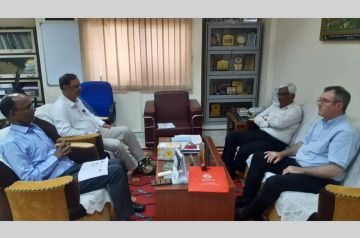A Walton Institute researcher was recently in India to focus on the development of a Centre of Cooperation (CoC) on Smart Technologies and Villages.
Walton Institute’s Jim Clarke recently visited India to explore the development of a Centre of Cooperation (CoC) on Smart Technologies for Agriculture and Villages in partnership with Indian Higher Education Institutions, government, and industry, as part of South East Technological University (SETU)’s ERAMUS+ project.
The CoC is starting as an Ireland-India centre with a view to expand to an EU-India centre based on a Public Private Partnership with a focus on using Smart Technologies for Agriculture to significantly improve villages’ socio-economic situation.
Mr. Clarke was kindly hosted by Mr Abhishek Sharma, CoC for Smart Technologies and Villages Coordinator; Prof M.P. Gupta, MODI Foundation Chair Professor with the Indian Institute of Technology Delhi, Department of Management Studies (DMS); Dr SK Singh (Director); and Prof Rajendra Sahu (Dean) at ABV-Indian Institute of Information Technology and Management Gwalior. Additional meetings were held with the Government of India and other industry stakeholder groups such as Confederation of India Industries (CII).
Research and innovation collaboration
The focus of the trip, which took place in July 2023, was research and innovation collaboration encompassed by the ramping up of the building of a Centre of Cooperation (CoC) in Smart Technologies for Agriculture and Villages; student exchanges programs; and curriculum building between the Institutes involved in Business, Management Studies, Engineering, Computer Science, and others.
A CoC on Smart Technologies for Agriculture and Villages is considered a highly beneficial project to both Ireland and India. Once completed, multiple segments of society – rural, urban, industrial, academic and research shall benefit, and it will also boost both countries’ economies. The participants are taking a stepwise approach, with the initial pilot project beginning with sample villages around Gwalior, India, and then multiplying gradually to other regions as it picks up speed.
International cooperation with India
Mr Abhishek Sharma, the India-based project coordinator of the CoC for Smart Technologies and Villages, initially visited Ireland in April 2023, where the project was presented to Hazel Peavoy, Senior Strategic Business Partner in Agriculture at Walton Institute, to explore potential research cooperation between the CoC and SETU, and two of its nationally funded projects, including VistaMilk[LB1] [JC2] , and another soon-to-be-launched project. It was agreed this international cooperation with India would be of significant interest to the internationalisation perspective of these two projects. Moreover, during the India visit of Mr. Clarke, it was further demonstrated the cooperation of these large-scale Irish projects would be considered of substantial relevance to IIT Delhi, IIIT&M, RVSKVV (Agriculture University) and would immensely benefit the researchers, faculty, and collaborating institutions of both the countries.
As part of the trip Mr Clarke and the CoC Coordinator, Mr Abhishek Sharma, held a meeting with the Senior Director of Confederation of Indian Industry Food & Agriculture Centre of Excellence (CII-FACE) to keep them apprised and geared up for the industrial part of the project’s implementation, where the need for inclusion of industry members was highlighted to bring a more commercial flavour, as the Smart Villages program has a very wide scope. According to Mr Sharma, “The proposed CoC not only encompasses the Food & Agriculture domain including Agricultural industries, but also the village’s total transformation philosophy, covering practically all sectors of the industry – electronics, ICT, IoT, manufacturing, chemicals and fertilizers, transportation, infrastructure, electricals, healthcare, education, and even sports and entertainment.”
Next steps
Horizon Europe’s EU-India Work Programme call (2024) under AI & Robotics for future exploitation was also explored as there would be substantial role of the AI & Robotics for the Smart Agriculture elements of the CoC.
Mr. Clarke and Mr. Abhishek Sharma also met with senior Directors of the Government of India’s Ministry of Electronics and Information Technology (MeitY) to discuss next steps in terms of Indian government funding for the CoC. Mr. Clarke says: “The relevant departments in MeitY have been supportive of the development of the CoC since the beginning and their enthusiasm has continued during this visit. It was shared that, at present, the responsibility of such a project related to development of the villages is with multiple ministries, including the Ministry of Rural Development, Ministry of Panchayti Raj, ICAR (Indian Council of Agricultural Research) and Ministry of Agriculture. To ensure proper coordination within these Ministries and the Departments, we were informed there is an overarching Ministry, and our next focus will be to present the project to the Ministry of Cooperation, who will advise on the next steps.
The valuable work in this project has been made possible by Erasmus Plus KA 107 programme of the European Union under Grant Number 2020-1-IE02-KA107-000723. ERASMUS+ is the EU’s programme to support education, training, youth, and sport in Europe. Started in 2014 and concluding in 2020, ERASMUS+ had an overall budget of €14.7 billion to provide opportunities for over 4 million Europeans to study, train, and gain experience abroad.
Photo Caption: Walton Institute's Jim Clarke meeting with Erasmus plus KA107 project members at ABV-IIIT&M Gwalior. L-R. Prof S. N. Singh, Director, Prof. Rajendra Sahu, Dean Management Studies, Mr. Abhishek Sharma, India SV CoC coordinator, Jim Clarke, SETU.


